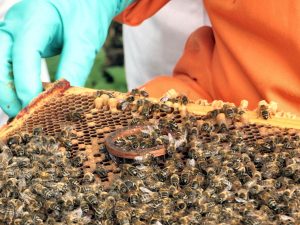Report from Peeblesshire
In 2014 the Peebles-shire Beekeeping Association committee agreed to ask members not to import bees but to use locally bred bees preferably of Amm or near Amm stock. If they were buying them to use a reputable breeder of guaranteed Scottish bred and reared dark stock, as close to Amm as could be obtained. Willie Smith of Innerleithen was thought to be one of Scotland’s first commercial beekeepers and designed the hive named after him which was made along American lines with short frame lugs and simple construction. He managed up to 150 colonies single-handed and successfully made a living from his bees. Willie passed away in 1969 and his colonies were taken over by George Hood from East Lothian. These were a local strain of bees known to have been in the area from the 1930s and were well adapted to this region. Willie was an expert beekeeper and considered the greatest in Scotland.
John and Morna Stoakley were well known beekeepers based in Peebles who were involved with BIBBA and held bee improvement and bee breeding classes in Stobo village school. They were strongly in favour of the native dark bee. John was an entomologist working for the Forestry Commission and he and Morna carried out a wing morphometry survey of Scottish honey bees which showed that native types remained widespread in Scotland. They were aware that in Peeblesshire locally bred stocks remained very close to native dark bees. This was due to previously low levels of imports and the local geography (long valleys, high steep-sided hills with barren tops) and local strains of bees managing to survive and reproduce.

Ettrick Valley
In 2012 a beekeeper from remote Ettrick Valley met the ferry in Oban to collect 2 colonies of Varroa-free, dark native bees from Andrew Abraham’s apiaries in Colonsay. Two neighbouring beekeepers had previously been on a course run by Andrew in Colonsay and were inspired to produce wildflower honey and to create a population of Varroa-free Amm bees in the valley. The valley is surrounded by steep-sided hills and there were no other bees being kept for miles, so they were hopeful of maintaining pure Amm stock with no contact with Varroa; in fact a mini-reserve on the mainland.
The following year another trip was made to Oban and a further 3 colonies were collected. By 2014 in this single valley there was a group of 4 beekeepers committed to keeping Amm stocks. They have good contacts and encourage any potential new beekeepers to source native colonies from Colonsay so maintaining Varroa-free Amm bees.
Although the valley location is almost 300 metres altitude, probably close to the limit for keeping bees, there is a good variety of native wildflowers which is supplemented by liberal planting of bee-friendly shrubs and other plants. One apiary site eventually proved to be too exposed and cold. The bees had difficulty finding enough forage although there was no problem with queens getting mated. Here one colony decided to replace their queen, unfortunately rather late in the season and at the start of wet weather. No replacement queen (Amm, Varroa-free stock) could be found and sadly that colony died out. Another apiary site had more forage and was better sheltered but faced a different problem due to isolation. Virgin queens did not get mated and another queen form a separate Colonsay lineage was sent over. This enterprising group of local beekeepers (Sheila Tyldesley, Melanie Fleming, David Sceatts and Mark Tuckwood) have worked hard to start a mainland reserve in an isolated valley with native dark bees which hopefully will remain Varroa-free. It has been difficult to maintain the colonies in this remote area but hopefully with better summer weather this Amm population will thrive. Sheila and Melanie generously host a visit from Peeblesshire BKA members most summers. They continue to encourage neighbours to take up beekeeping and to bring in only Varroa-free Amm stock.
Key Association activities
The key for maintaining support for the preservation of Amm native bees lies in the enthusiasm of local beekeepers – Ettrick being a good example where the beekeepers welcome visitors and also keep in touch with their local community through talks and demonstrations. Raising public awareness is the key – there is certainly a lot of public support and an excellent market for the products. It may be that ‘native bee’ products could attract a premium at local markets. Apart from an annual beginners’ course we regularly produce features for local newspapers and magazines and take a stall at the local agricultural show. Members also visit schools and youth groups. Thanks to grant funding we are able to lend bee suits and invite non-beekeepers along for ‘taster’ sessions.
Amanda Clydesdale
Peeblesshire BKA
